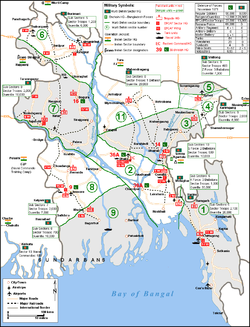Operation Jackpot
| Operation Jackpot | |||||||||
|---|---|---|---|---|---|---|---|---|---|
| Part of Bangladesh Liberation War | |||||||||
 Partial representation of Operation Jackpot Logistical setup in November 1971. A generic representation, some of the location are indicative because of lack of primary data. |
|||||||||
|
|||||||||
| Belligerents | |||||||||
|
|
|
||||||||
| Commanders and leaders | |||||||||
|
* Submariner Abdul Wahed Chowdhury * Submariner Ahsanullah * Submariner Badiul Alam * Submariner Abdur Rahman * Submariner Shahjahan Siddique |
|
||||||||
| Strength | |||||||||
|
Mukti Bahini : 148 naval commandos under sector 10. |
Pakistan Army: East Pakistan Civil Armed Force: 6 Sector HQ wings, 17 operational Wings Razakars |
||||||||
Pakistan Army:
14th Infantry Division
9th Infantry Division
16th Infantry Division
39th Ad hoc Infantry Division
36th Ad Hoc Infantry Division
97th Independent Infantry Brigade
40th Army Logistic Brigade
4th Army Aviation Squadron
Pakistan Navy:
Special Service Group Navy
Pakistan Marine Corps
17th Naval SD Squadron
Pakistan Air Force:
No. 14 Squadron
Operation Jackpot was the codename for several military operations during the Bangladesh Liberation War in 1971. Indian Army Eastern Command initiated the original "Operation Jackpot", an integrated logistical and training operation for the Mukti Bahini on 15 August 1971
Operation Jackpot also refers to the simultaneous attacks of Bengali naval commandos as part of Mukti Bahini on 15 August during the Bangladesh Liberation War in 1971. The commando operation that sabotaged Pakistan Navy and her assets in Chittagong, Chandpur, Mongla and Naryanganj on 15 August is known as "Operation Jackpot". It was the first major involvement of Naval Special Service Group, under Commodore David Felix, in the conflict and actively participated in the conflict. Ironically, SSG(N) also led their counter-operations under the same codename.
The operational plan of Lt. General Sagat Singh commanding the Indian IV Corps against the Pakistani 14th and 39th Divisions and the 97th Independent Infantry Brigade positioned in Sylhet, Comilla, Noakhali and Chittagong Districts during 3 – 16 December was also called Operation Jackpot
After the Pakistan Army launched Operation Searchlight in March 1971 in a bid to curb all resistance (political and otherwise), the Indian government decided to open the borders to admit millions of Bengali refugees and the Bengali resistance forces aided by the Awami League. By mid-May, Pakistan Army had occupied all major towns in Bangladesh and had driven the battered remnants of the Mukti Bahini across the border into India, forcing the Mukti Bahini to switch to guerrilla warfare under the training and guidance of the Indian Army. The Indian BSF (Border Security Force) had given supplies locally to the Mukti Bahini since March, and had even made some incursions across the border into East Pakistan, but these efforts had been disorganised, uncoordinated and inadequate to meet the needs of the Mukti Bahini. Once the Indian army completely took over aiding the Mukti Bahini, they decided to launch a fully fledged integrated operation, codenamed Operation Jackpot. The Indian Military Intelligence also recognise the operational abilities of Pakistan's Naval Special Service Group that had conducted the Operation Barisal, which resulted in an ultimate success. Prior to launch of this operation, the Pakistan's Eastern Naval Command was well established by its Officer Commanding Rear-Admiral Mohammad Shariff. The main objective of this operation was to sever the maritime communications between East Pakistan and West Pakistan.
...
Wikipedia
